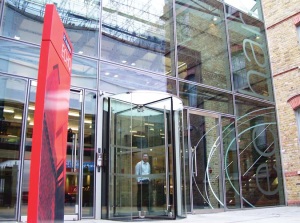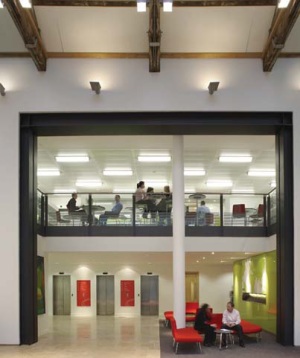How EC Harris’ move to a new HQ has changed its way of working
LONG BEFORE EC HARRIS MOVED TO ITS NEW HEADQUARTERS near Kings Cross Station, it was a changed company. It had grown from being a traditional ‘quantity surveyor’ to an organisation that embraced 19 disciplines across construction and FM in 40 countries. However, its home base in London’s Tavistock Square since 1957, no longer met its operational or cultural needs.
The partners and staff embraced the need for change and have transformed the way the business operates and performs by moving to the new ECHQ. The move and the business transformation won the PFM Awards 2007 Partners in Business Change Award. The transformation was achieved through a partnership between EC Harris as client, the internal EC Harris FM team, architects and designer, Swanke Hayden Connell, and the IT solutions provider, MITEL.
CEO Philip Youell explained that the drivers were the need to create an environment which brought people together using practical and modern design and created a communications blueprint for its global business.
“The architects picked up on this ethos, and understood the drivers,” he said.
The former railway iron works beside Kings Cross Station was selected from a range of sites across the capital. It provided the large floor plates on four floors, and enabled transparency between departments and floors to refresh the company culture in a way that the partners wanted.

The new office environment had also to drive changes in EC Harris’s working practices to incorporate the latest thinking in workplace design and efficiency, minimises the firm’s environmental impact, and break down traditional barriers by inviting clients into the EC Harris workspace. According to Paul Birtwistle, Group Facilities Manager and Associate, “Changing the way over 800 people work is a major challenge. We did it by promising they would all be better off. We delivered that promise by giving them a better place to work, better facilities and a better quality of working life.”
Now the global HQ for EC Harris, ECHQ at 34 York Way, London N1 is based on ‘landside’ and ‘airside’ principles but without oppressive airport-style security. A ‘welcome’ team operating from a small counter at the entrance welcomes clients to public access areas including the ground floor cafe, bar, meeting rooms and drop-in wired and wi-fi work spaces . These landside facilities create a focal point and social hub for the office to increase informal contact between staff and clients.
‘Airside’, the challenge was to move to hot desking whilst keeping teams together and providing a sense of belonging to staff who spent part of their time on site or working at clients premises or from home. Clusters of desks mirror team configurations and internal signing identifies areas for different departments. Whilst not paper free, the aim is to keep ‘clutter’ at a low level. Ample cupboards for outdoor clothing and lockers for individual ‘boxes’ of desk top essentials flexi-desks help keep the environment clean and open.
Each floor has free vending areas and break out space. A strict no eating and drinking at the desk policy ensures that not only do people take natural breaks from working at their PCs and laptops, but they also meet informally in these spaces.
There are only two offices in the building. Partners and key people who were recognised as ‘knowledge nodes’ were deliberately sited throughout the building. As Youell explained, “Knowledge is transferred through people and some people are information ‘nodes’ through their jobs or behaviours. We positioned these people in different parts of the building to encourage movement.”
In Tavistock Square, 800 EC Harris staff occupied 800 desks. At ECHQ, some 570 people were accommodated at just 540 desks and a further 200 were based at client premises. Since moving in the business has grown but the desk numbers have not — now 920 people work from the same number of desks.
Youell explained that the role of ECHQ clearly demonstrates how the company has changed. “More people invite clients to the building, and clients are encouraged to come and use the facilities. More people from industry come to the building for industry events. Staff have pride in the building.”

In the months after the move the staff attrition rate was down 20 per cent, and since then this has dropped further.
A pre-move survey also discovered that a cafe would provide a better way for sector teams and different departments at EC Harris to meet and work together. This, and the addition of a bar, which opens from 5.30-7.45 Wednesday to Friday each week with drinks dispensed free by the partners in turn, has proved to be highly successful with up to 150 people enjoying the informal gathering of staff, clients, friends and family.
EC Harris used the move to the new HQ to ensure sustainability is at the heart of the way the company operates. Moving from a naturally ventilated inefficient building to an airconditioned but efficient building, has focused attention on continuously reducing the carbon footprint of the company year on year. It was decided to offer no parking places in ECHQ, enabling the basement space to be used to house secure cycle storage, showers and changing rooms.
In the first three months of occupation of the new building, EC Harris saved the equivalent of 181 trees and 22,260k CO2. Currently 99 per cent of waste is recycled, all everyday items such as coffee, tea, sugar, paper towels etc are from fair trade sources and all packaging is recyclable. Carpet tiles and flooring are recyclable as are desks and seating. PIR detectors control general office lighting. Carbon offsetting has seen planting of rain forest, and woodlands in the UK.
A fundamental change in working practice has been the introduction of optical filing systems. This has already reduced file storage from 3,500 linear metres to 840 metres, reducing further week by week as the digitisation programme progresses. Moving to electronic media has seen the firm’s consumption of paper reduced by 30 per cent.
ECHQ enabled EC Harris to lay the foundations of a new global IT infrastructure, and this now rolling out across satellite and overseas offices. The VOIP and data solution adopted allows staff on hot desks to log into their own phone and call up their own desktop wherever they are in ECHQ — or any other EC Harris office. Staff based at ECHQ can access their desktop and use their phone as if they were in the office anywhere there is a broadband connection. Landlines and mobiles can be forwarded to each other meaning no member of the team is ever out of touch. The system is the same making logging on easy at any of their offices worldwide.
Every phone at ECHQ is programmed with hot keys for Helpdesks for FM and IT and responses are fast with e-mail confirmations sent out automatically. Group FM and Associate, Paul Birtwhistle, has a team of 17 including six security staff and five specialist filing and scanning staff, and most are multi-skilled. Cleaning is outsourced to LCC, M&E to IML and catering to Baxter Storey.
ECHQ has proved a catalyst for change across its entire estate with not only the IT and telecoms designed to provide an easy one point ‘plug in’ for staff across the world, but also the changing culture and working environment has been replicated locally.
“This is a dynamic business that quickly grows out of its buildings,” Youell explained. Normally EC Harris does not take on leases of more than five years. ECHQ has proved an exception with a 15-year lease because it is designed to enable the business to change and grow. He attributes EC Harris’ 25 per cent increase in turnover last year over the previous year to the changes bought about in the culture of the company. The company ‘brand’ is clearly demonstrated through this building, and it has raised the company profile in its industry sector and with its clients.
The PFM Awards judges said, “By taking an innovative approach to the built environment there has been a complete change in the working practices and culture of the company. Excellent.”